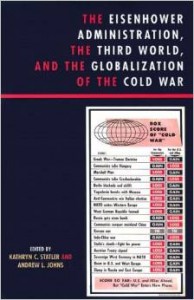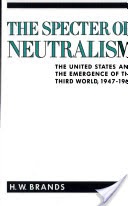Higgins, Benjamin Howard, and Guy J. Pauker. “Economic Implications of the Asian-African Conference and Its Aftermath.” Technical Report. [Cambridge, Mass. : Massachusetts Institute of Technology, Center for International Studies, 1955], 1955.
Category Archives: Region
Region of the world associated with the content of the article, book, etc.
The Specter of Neutralism: The United States and the Emergence of the Third World, 1947-1960
The Imperial Mantle: the United States, Decolonization, and the Third World
 Newsom, David D. The Imperial Mantle: the United States, Decolonization, and the Third World. Bloomington: Indiana University Press, 2001. http://summit.worldcat.org/oclc/50174744.
Newsom, David D. The Imperial Mantle: the United States, Decolonization, and the Third World. Bloomington: Indiana University Press, 2001. http://summit.worldcat.org/oclc/50174744.“Two questions have constantly been posed to me over these years. Those in new nations have asked, ‘Why does the US, with its own record of independence, not understand the attitudes of the Third World?’ In the US, people ask, ‘Why do the new nations exhibit such anti-American sentiments when we oppose imperialism and provide substantial help to them?'” “Whoever writes about the expressions and actions of the Third World faces immediate problems of credibility from both sides. Some may feel that dissident voices critical of the United States are overemphasized or exaggerated. I have no excuse; looking back at events I have observed I have often felt the only honest voices were those that told us what we did not want to hear. New nations often resent foreign analysis. In the developed world, those who seek to explain vagaries of the Third World are called apologists. The irrelevant question, ‘Whose side are you on?’ is frequently asked.” –David D. Newsom
Continue reading The Imperial Mantle: the United States, Decolonization, and the Third World
The Eisenhower Administration, the Third World, and the Globalization of the Cold War
Statler, Kathryn C, and Johns, eds. The Eisenhower Administration, the Third World, and the Globalization of the Cold War. Harvard Cold War Studies Book Series. Lanham, Md.: Rowman & Littlefield, 2006.
The Eisenhower Administration, the Third World, and the Globalization of the Cold War. Harvard Cold War Studies Book Series. Lanham, Md.: Rowman & Littlefield, 2006.
Contents:
- Thinking globally and acting locally / Chester J. Pach, Jr.
- Words and deeds : race, colonialism, and Eisenhower’s propaganda war in the Third World / Kenneth A. Osgood
- The Central Intelligence Agency and the face of decolonization under the Eisenhower administration / John Prados
- “The most important single aspect of our foreign policy”? : the Eisenhower administration, foreign aid, and the Third World / Michael R. Adamson
- “The point of no return” : the Eisenhower administration and Indonesia, 1953-1960 / Robert J. McMahon
- Building a colony : South Vietnam and the Eisenhower administration, 1953-1961 / Kathryn C. Statler
- Militant diplomacy : the Taiwan Strait crises and Sino-American relations, 1954-1958 / Yi Sun
- Small victory, missed chance : the Eisenhower administration, the Bandung conference, and the turning of the Cold War / Jason C. Parker
- “A torrent overrunning everything” : Africa and the Eisenhower administration / James H. Meriwether
- Persistent condor and predatory eagle : the Bolivian revolution and the United States, 1952-1964 / James F. Siekmeier
- The United States and Israel in the Eisenhower era : the “special relationship” revisited / Peter L. Hahn
- Middle East cold wars : oil and Arab nationalism in U.S.-Iraqi relations, 1958-1961 / Nathan J. Citino
- The devil is in the details : Eisenhower, Dulles, and the Third World / David L. Anderson
The Political and Moral Imperatives of the Bandung Conference of 1955 the Reactions of the US, UK and Japan.
Ampiah, Kweku. The Political and Moral Imperatives of the Bandung Conference of 1955 the Reactions of the US, UK and Japan. Folkestone, UK: Global Oriental, 2007.
Record Description: Now fifty years on, with significantly more primary references available,Kweku Ampiah’s study provides a much-needed in-depth re-evaluation of the conference as a whole, focusing in particular on the external influences and preoccupations impacting on the participants seen through three case studies involving the US, UK and Japan.
Asian Internationalism: Bandung’s Echo in a Colonial Metropolis
Amrith, Sunil S. “Asian Internationalism: Bandung’s Echo in a Colonial Metropolis.” Inter-Asia Cultural Studies 6, no. 4 (December 2005): 557–69. doi:10.1080/14649370500316869.
ISSN: 14649373
Abstract:
This paper argues that two conflicting discourses of internationalism stood in uneasy counterpoint and contention in the Asian arena of the 1950s, reflected in the legacies of the Bandung conference. The first drew on a language of global citizenship and rights. The second saw the international system as a source of strength and support for state sovereignty, and state‐directed programmes of national development. The remainder of the paper uses the case of late‐colonial Singapore to examine the intersection of these two discourses of internationalism. An Asian internationalism, which spanned to include Africa over the course of the 1950s, became one of a stock of narratives that made Singapore’s ‘everyday cosmopolitanism’ possible, in the worlds of the hawkers, the dockworkers and the agriculturalists. The political aspirations of these groups were sacrificed, ultimately, to the goal of disciplined national development, supported by an international order that had closed in to defend the interests of state power.


